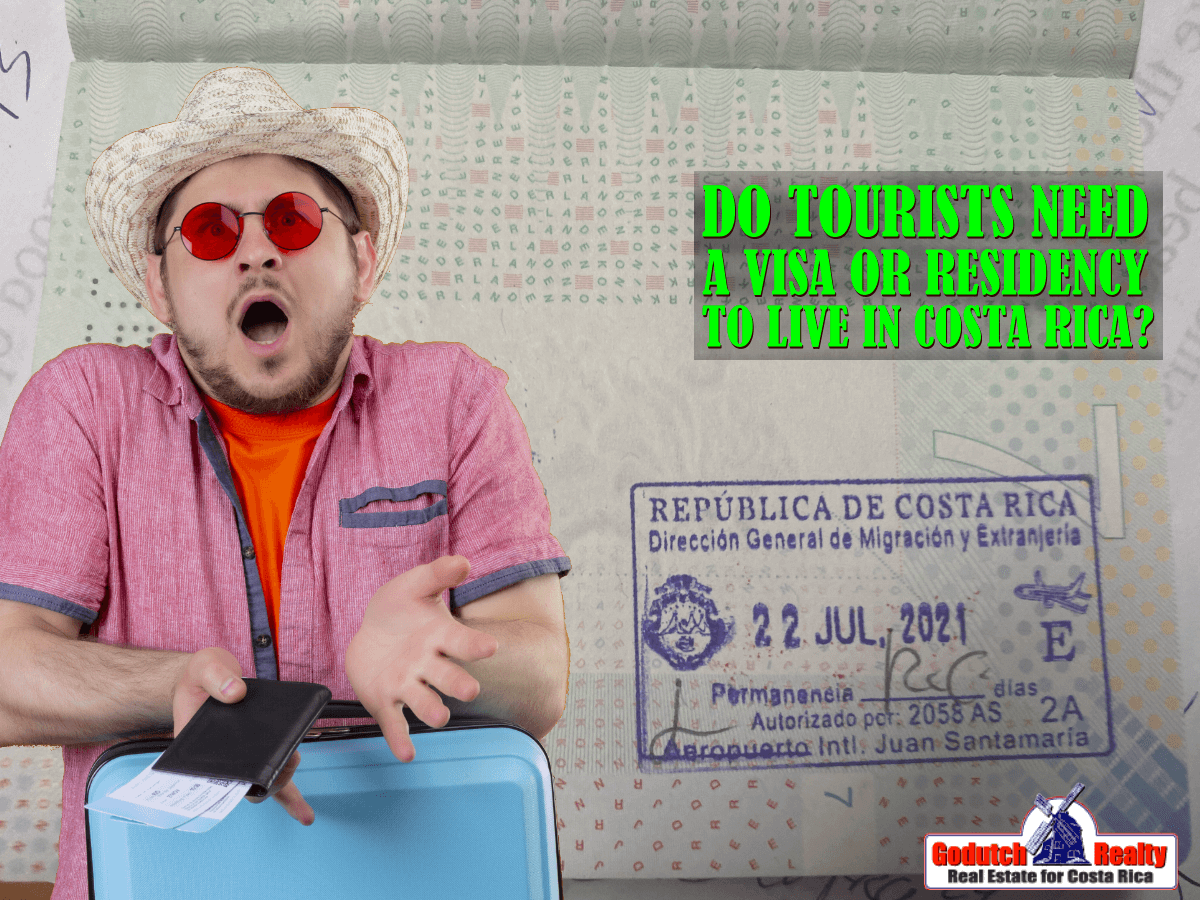Estimated Reading Time: 6 Minutes
U.S. Citizens and Canadians do not need a tourist visa or residency card to enter Costa Rica as tourists; they only need a valid passport. Most Europeans do not need a visa to enter our country either. They’re lucky because Costa Ricans need a visa to go to their countries (many of them). Anyone not born in Costa Rica needs legal residency to live legally in Costa Rica. There are many options to obtain residency; the easiest is buying a property for over $150,000.
Take your time and travel the country as much as possible to find the right spot to buy your desired home. Meanwhile, a border run should cover you every 180 days.
The government divides the tourist visa requirements into two groups. The first is a group of countries whose citizens do NOT need a visa and can visit Costa Rica for up to 180 days. US and Canadian nationals do not require an entry visa to Costa Rica. However, they must have a current valid passport and a return ticket to exit Costa Rica within 180 days.
The second group is a list of countries whose citizens DO need a tourist visa and can visit Costa Rica for only up to 30 days. You can check how many days your tourist visa will be valid and choose your nationality quickly.
Although it sounds a bit strange, the customs agent can ask for proof of economic means, with a minimum of US$100.00 (one hundred US dollars) per month or partial month of legal stay in the country.
This information about staying up-to-date with your tourist visa is provided because Godutch loves to do business with you. So check out our houses for sale now.

Renew the tourist visa
Do NOT overstay your visa!!!! There are two ways of legally extending your visa. Many perpetual tourists live in Costa Rica permanently, but there are a few rules to follow.
1. Follow the directions in this document by Immigration. This will only renew your tourist visa for 60 days.
2. Go across the border, have lunch or a cold beer, come back, and get your entree stamp.
Onward ticket
If you don’t have a return ticket, the airline is supposed to ask you if you are a resident of Costa Rica before they allow you to board your flight to Costa Rica. So, as long as you don’t have legal residency, you must show a ticket out of the country. I know some people who get away with having a Tica Bus ticket to show for their onward ticket, but some people get rejected.
If you need only one extension of your return ticket, you can do so with the airline before the 90 days are over. You still have to exit the country (border run) to show you’ve been out of the country. Check online forums for more information from other expats who do this continuously.
A border run
Thousands of expats who don’t want to bother applying for legal residency do a border run every 180 days. Many do this to stay legal or to be able to use their foreign driving license here. Be aware that this is NOT 3 months, as there are 92 days in three months. Also note that if you’re a US citizen and therefore have a 180-day visa, using your US driver’s license is only possible for 90 days (for now).

Residency
Doing a border run every so often is a hassle. If you don’t want to, get legal residency. I strongly recommend this, especially if you’re buying a property here. These are the 3 most logical ways for an expat to request legal residency.
1. Inversionista.
Buy a property for at least $150,000. Learn more here.
2. Pensionado.
You qualify for the Pensionado program if you have a pension of at least $1,000/month. Learn more here.
3. Rentista.
If you can show at least a $2,500/month fixed income for two years, you can apply for the Rentista category. Learn more here.
Work
If you don’t have a permanent residency free of conditions, you cannot work in Costa Rica. Learn all you need to know about working permits now.
Street smarts
I know this really nice guy who has been doing border runs for many years. He has never been able to apply for residency because he doesn’t meet the requirements. We’ll call him Dennis for this blog’s sake.
Dennis has done his border run to Panama for a few years and started doing them to Nicaragua because it’s easier, he says. Here are his tips:
Ticket
The 90-day Tica Bus ticket has always worked for me coming in from Nicaragua. The Panama border might be more difficult. For one thing, to get into Panama, the Panamanian authorities DO require a plane ticket back to your home country. So I stopped going there. However, I’ve read that there’s a travel agent at the border who can sell you a cheap flight that they can then cancel within 24 hours.
I’m not sure how Tico immigration is when you return from Panama, but they’ve always been more of a pain at Paso Canoas. It is probably easier on the Caribbean side. But I gave up on Panama long ago, so I can’t say for sure.

A big smile
Coming into CR from Nicaragua, I think one of the keys is just having a big smile on your face. Try to look halfway presentable. Then show them the bus ticket before they even ask about it (hand them your passport and the ticket simultaneously). They usually see that it’s for 180 days out, and they often don’t even ask how long I’ll be staying in CR.
Be prepared
They sometimes ask what you’ll be doing in CR for 3 months. Or why you’ve come in and out so often. So it’s good to have some kind of story prepared/rehearsed. I’m old enough to say that I’ll soon be receiving part of my pension, with which I’ll apply for residency. I tell them that I’m starting to look at houses, etc. Years ago, I would sometimes say I’m getting a dental implant, which takes several visits. And that there was a problem and they had to order an extra part, etc., etc. If you talk long enough, they’ll just say, “Fine…fine. Go ahead!”.
Of course, I’m fluent in Spanish, so that might not work for everyone.
Money
They say you must have at least $600 for the 180 days or $300 for 90 days (or a credit card with that much on it). But they’ve never asked me about that at the CR/Nicaragua border. They did ask one time when entering Panama, but I did see them ask two dirty surfer dudes one time.
Exit tax
It’s best to buy your exit tax ($8) in San Jose, like at Servimas in Walmart, or at any Banco de Costa Rica. I think they are now selling them at the Tica Bus terminal. The machines at the border don’t work very well.
This free information is our way of inviting you to use our real estate services when needed. Contact us now to buy a property in Costa Rica.
























1 Comment
It’s Official! On May 7th, 2024, Legislative Decree N. 10470 was officially posted to “La Gaceta” — the Diario Oficial of Costa Rica’s Legislative Assembly, enacting the long awaited amendments to the Law on Traffic on Public Land Roads and Road Safety. The corresponding Bill of Law had been approved in second debate on April 2nd, and now it is finally in force.